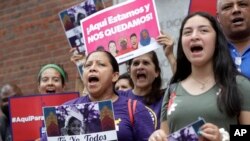ປະຊາຊົນຂອງຫົກປະເທດ ທີ່ຢູ່ໃນສະຫະລັດ ພາຍໃຕ້ຖານະພິເສດທາງດ້ານມະນຸດ
ສະທຳຈະໄດ້ຮັບອະນຸຍາດໃຫ້ຢູ່ຕໍ່ໄປອີກ ອີງຕາມການປະກາດຂອງລັດຖະບານສະ
ຫະລັດ ໃນວັນສຸກວານນີ້ ໂດຍກ່າວວ່າ ຈະມີການເລື່ອນເວລາໃນການຍຸຕິໂຄງການ
ຂອງລັດຖະບານປະທານາທິບໍດີທຣຳ ສຳລັບບາງກຸ່ມ.
ພວກເຈົ້າໜ້າທີ່ໄດ້ເລື່ອນເວລາ ກ່ຽວກັບການຍຸຕິການໃຫ້ຖານະພິເສດຊົ່ວຄາວ ຫຼື
TPS ແກ່ຊາວແອລຊາລວາດໍ ເຮຕີ ຮອນດູຣາສ ເນປານ ນິກາຣາກົວແລະ ຊູດານ
ເພື່ອໃຫ້ສອດຄອງກັບຄຳສັ່ງຂອງສານທີ່ເລີ້ມມາຈາກການຟ້ອງຮ້ອງທີ່ກຳລັງດຳເນີນ
ຢູ່ ທີ່ລັດຖະບານໄດ້ກ່າວ ຢູ່ໃນເອກກະສານ ນຳອອກເຜີຍແຜ່ໃນວັນສຸກວານນີ້.
ການຟ້ອງຮ້ອງ ໂດຍກຸ່ມປົກປ້ອງສິດທິພົນລະເຮືອນ ແລະສິດທິຄົນເຂົ້າເມືອງ ໄດ້
ທ້າທາຍຕໍ່ການຍຸຕິໂຄງການ TPS ໃຫ້ແກ່ພວກຄົນເຂົ້າເມືອງຈາກຫົກປະເທດ ຊຶ່ງ
ຕົ້ນຕໍນັ້ນ ມີກຳໜົດຈະເລີ້ມຂຶ້ນ ໃນຕົ້ນປີໜ້າ.
ພວກທີ່ໄດ້ຮັບຖານະ TPS ຈາກບັນດາປະເທດເຫຼົ່ານີ້ຈະໄດ້ຮັບການຕໍ່ອາຍຸຢ່າງ
ອັດຕະໂນມັດ ໄປເຖິງວັນທີ 4 ມັງກອນປີ 2021 ແຕ່ກໍມີເງື່ອນໄຂ. ໃນຂະນະທີ່ຜູ້ຮ້ອງ
ຂໍອາດຈະຢູ່ ແລະເຮັດວຽກຢ່າງຖືກຕ້ອງຕາມກົດໝາຍ ຢູ່ໃນສະຫະລັດ ໃນໄລຍະຕໍ່
ອາຍຸນັ້ນ ເອກກະສານທີ່ນຳເຜີຍແຜ່ໃນວັນສຸກວານນີ້ກ່າວວ່າ ຖ້າຫາກຜູ້ພິພາກສາ
ຕັດສິນເຫັນພ້ອມກັບລັດຖະບານໄວກ່ອນນັ້ນ ຜູ້ມີຊື່ຢູ່ໃນ TPS ຈາກບັນດາປະເທດ
ເຫຼົ່ານັ້ນ ຈະມີເວລາແຕ່ 120 ມື້ ຈາກຈຸດດັ່ງກ່າວເພື່ອປັບປຸງຖານະຄົນເຂົ້າເມືອງ
ຂອງເຂົາເຈົ້າ ຫຼືໜີອອກຈາກປະເທດ.
ຄຳປະກາດດັ່ງກ່າວມີຂຶ້ນ ຫຼັງຈາກມີຂ່າວ ໃນວັນຈັນທີ່ຜ່ານມາ ລຸນຫຼັງທີ່ມີການສົ່ງ
ຂໍ້ຄວາມທາງທວິດເຕີໂດຍປະທານາທິບໍດີແອລຊາລວາດໍ ທ່ານນາຢິບ ບູເກີລີ ທີ່ເວົ້າ
ວ່າ ໄດ້ມີການບັນລຸຂໍ້ຕົກລົງກັບວໍຊິງຕັນເພື່ອຕໍ່ຖານະການປົກປ້ອງໃຫ້ແກ່ຊາວແອລ
ຊາລວາດໍ ປະມານ 250,000 ຄົນ ຢູ່ໃນສະຫະລັດ ທີ່ເປັນກຸ່ມ TPS ທີ່ໃຫຍ່ສຸດ.
ບັນດາຊາວແອລຊາລວາດໍ ທີ່ຮ້ອງຂໍອາດໄດ້ຮັບການຕໍ່ອາຍຸຕື່ມອີກນຶ່ງປີ ໂດຍຈະ
ຍືດໄປເຖິງປີ 2022 ອີງຕາມເອກກະສານ ແລະຖະແຫຼງການຂອງທ່ານບູເກີລີ.
ການປະກາດຂອງສະຫະລັດ ໃນວັນສຸກວານນີ້ ໄດ້ເປັນທີ່ຄາດໝາຍກັນໄວ້ໃນ
ຮອນດູຣັສ ບ່ອນທີ່ເມື່ອຕົ້ນອາທິດນີ້ ສື່ມວນຊົນຂອງປະເທດໄດ້ລາຍງານການ
ຕໍ່ອາຍຸໃຫ້ແກ່ຊາວຮອນດູຣັສຈຳນວນນຶ່ງ ທີ່ຢູ່ໃນສະຫະລັດ.
ສະຫະລັດໄດ້ໃຫ້ຖານະ TPS ແກ່ພວກທີ່ມາຈາກບັນດາປະເທດ ທີ່ຢູ່ໃນວິກິດ
ການ ບາງເທື່ອຢູ່ໃນເສິກສົງຄາມ ໃນເວລາອື່ນໆເນື່ອງຈາກໄພທຳມະຊາດ ຜູ້ທີ່
ໄດ້ຢູ່ໃນສະຫະລັດແລ້ວນັ້ນ ແລະບໍ່ສາມາດກັບຄືນສູ່ປະເທດຂອງເຂົາເຈົ້າດ້ວຍ
ຄວາມປອດໄພ.
Nationals of six countries who live in the United States under a special humanitarian status will be permitted to stay longer, the U.S. government announced Friday, delaying the Trump administration's target dates for terminating the program for certain groups.
Officials pushed back the end date of Temporary Protected Status for El Salvador, Haiti, Honduras, Nepal, Nicaragua, and Sudan, in order to comply with court orders stemming from ongoing lawsuits, the government said in a document released Friday. (( https://s3.amazonaws.com/public-inspection.federalregister.gov/2019-24047.pdf ))
The lawsuits were brought by civil rights and immigrant rights groups challenging the termination of TPS for nationals of the six countries, which was originally scheduled for early next year.
TPS recipients from those nations will have their status automatically extended to January 4, 2021, but with a caveat. While recipients may continue to live and work legally in the U.S. for an extended period, the document released Friday states that, should a judge rule in favor of the government sooner, TPS holders from the named countries will have only 120 days from that point to adjust their immigration status or leave the country.
The announcement follows Monday's news, tweeted by El Salvador President Nayib Bukele, that a deal had been struck with Washington to extend protected status for approximately 250,000 Salvadorans residing in the U.S. the largest of the TPS groups. (( https://www.voanews.com/usa/immigration/washington-extends-tps-end-date-salvadorans ))
Salvadoran recipients may get an extension for an additional year, pushing the end date to 2022, according to the document and statements by Bukele.
Friday's U.S. announcement had been anticipated in Honduras, where earlier this week the country's news media reported an extension for some Hondurans living in the US (( https://www.laprensa.hn/honduras/1330626-410/tps-ampliara-meses-automaticamente-canciller-lisandro-rosales-honduras )), based on comments made by Honduran Foreign Minister Lisandro Rosales.((https://twitter.com/lisandrorosales/status/1190313926631809024 ))
The United States offers TPS to citizens of nations in crisis - sometimes from war, other times due to a natural disaster - who are in the US already and cannot safely return to their country.





